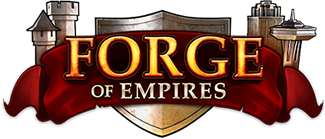Spedizioni di Gilda: differenze tra le versioni
| Riga 6: | Riga 6: | ||
Se ti unisci o crei una gilda quando le spedizioni sono già iniziate, dovrai attendere fino al prossimo Martedì per partecipare ad una nuova spedizione. | Se ti unisci o crei una gilda quando le spedizioni sono già iniziate, dovrai attendere fino al prossimo Martedì per partecipare ad una nuova spedizione. | ||
== | == Mappa delle Spedizioni == | ||
[[File:ExpeditionMap.png|center|link=]] | [[File:ExpeditionMap.png|center|link=]] | ||
Come puoi osservare la mappa ha un aspetto ed una colonna sonora in tema giungla. Ogni giocatore in gilda avrà la propria mappa individuale per completare gli incontri ma tutti condivideranno la medesima barra degli obiettivi nella parte superiore dello schermo (o in basso, se giochi tramite l'applicazione mobile). | |||
La barra degli obiettivi rappresenta i '''Punti Spedizione''' raccolti dalla gilda e, ogni volta che raggiungerete un nuovo obiettivo, la Gilda otterrà il potere indicato. Dato potere verrà aggiunto a quello complessivo ogni giorno, dopo il ricalcolo quotidiano. Puoi cliccare sulla barra per visualizzare ulteriori dettagli. | |||
[[File:ExpeditionGoalBar.png|center|link=]] | [[File:ExpeditionGoalBar.png|center|link=]] | ||
I punti della Spedizione provengono dalle varie isole che puoi visualizzare sulla mappa, località chiamate '''Incontri''', dove poter effettuare delle battaglie contro armate sempre più forti. Le conquiste possono avvenire con i combattimenti o attraverso un gioco di negoziazione. Ogni volta che si risolve un incontro, sarà possibile raccogliere una ricompensa personale dal forziere nell'isola immediatamente successiva, per poi continuare lungo il sentiero. | |||
Procedendo ulteriormente, la nebbia nella mappa si dissolverà, rivelando incontri e forzieri aggiuntivi. Sii consapevole del fatto che le isole più 'grandi' e dorate saranno molto più difficili da conquistare rispetto a quelle "piccole". Se ti smarrisci nella mappa, una freccia d'oro indicherà la tua attuale posizione! | |||
== Solving Encounters == | == Solving Encounters == | ||
Versione delle 15:50, 24 ago 2016
Cosa sono le Spedizioni di Gilda?
La Spedizione di Gilda è una modalità cooperativa accessibile sia da browser che da applicazione mobile in cui tu ed i tuoi compagni di gilda unirete le forze attraverso una serie di incontri di difficoltà crescente, per acquisire ricompense personali e potere per la Gilda.
Le Spedizioni iniziano automaticamente ogni Martedì e durano per 6 giorni. Ogni giocatore appartenente ad una gilda e che ha raggiunto almeno l'età del ferro, nel momento in cui inizia una spedizione, può contribuire al successo della sua gilda, partecipando alla spedizione in corso. È possibile accedere alle Spedizioni di Gilda dai pulsanti del menu di gioco.
Se ti unisci o crei una gilda quando le spedizioni sono già iniziate, dovrai attendere fino al prossimo Martedì per partecipare ad una nuova spedizione.
Mappa delle Spedizioni
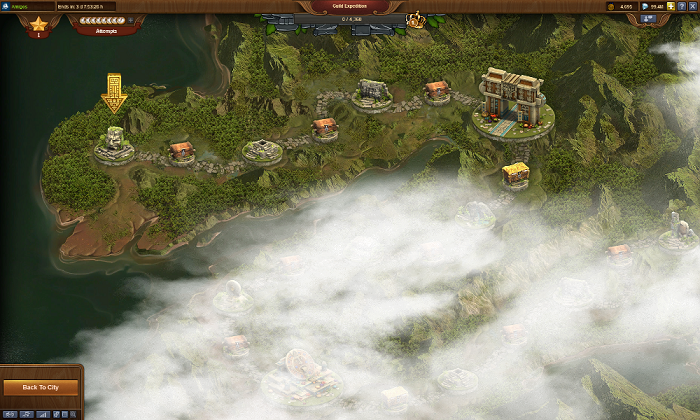
Come puoi osservare la mappa ha un aspetto ed una colonna sonora in tema giungla. Ogni giocatore in gilda avrà la propria mappa individuale per completare gli incontri ma tutti condivideranno la medesima barra degli obiettivi nella parte superiore dello schermo (o in basso, se giochi tramite l'applicazione mobile).
La barra degli obiettivi rappresenta i Punti Spedizione raccolti dalla gilda e, ogni volta che raggiungerete un nuovo obiettivo, la Gilda otterrà il potere indicato. Dato potere verrà aggiunto a quello complessivo ogni giorno, dopo il ricalcolo quotidiano. Puoi cliccare sulla barra per visualizzare ulteriori dettagli.
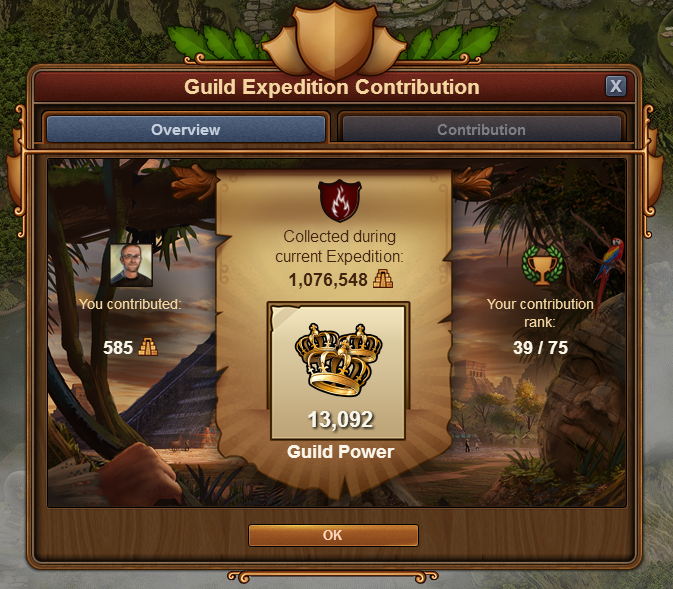
I punti della Spedizione provengono dalle varie isole che puoi visualizzare sulla mappa, località chiamate Incontri, dove poter effettuare delle battaglie contro armate sempre più forti. Le conquiste possono avvenire con i combattimenti o attraverso un gioco di negoziazione. Ogni volta che si risolve un incontro, sarà possibile raccogliere una ricompensa personale dal forziere nell'isola immediatamente successiva, per poi continuare lungo il sentiero.
Procedendo ulteriormente, la nebbia nella mappa si dissolverà, rivelando incontri e forzieri aggiuntivi. Sii consapevole del fatto che le isole più 'grandi' e dorate saranno molto più difficili da conquistare rispetto a quelle "piccole". Se ti smarrisci nella mappa, una freccia d'oro indicherà la tua attuale posizione!
Solving Encounters
The amount of consecutive encounter solving attempts is limited to 8 and each time you begin a battle or spend resources in a negotiation game, 1 attempt point is withdrawn. You can see the amount of attempts you still have on the attempts bar:

When you run out of them, you can either wait for them to regenerate (you get 1 per hour) or buy them with medals (or Diamonds). The medals price for each attempt will rise as you purchase more. At the end of the Expedition the cost will reset, so you will have a fresh start each week.
Regardless of the outcome of your attempt, you will contribute some expedition points to the guild progress bar (obviously if you lose, it won't be that much). The guild goals depend on the number and era of the guild members (these are set when the expeditions begin, they will not change even if you gain or lose guild members over the week) and are shared between all guild members.
Fighting
As we mentioned, you can solve encounters in one of two ways - fighting or negotiation. Fighting should already be known to you, because it is the same as everywhere in the game (the Continent Map, PvP, and GvG).
The units' age and the overall difficulty of the encounters depend on your own advancement in the tech tree when the expedition begins. You may also face two-wave battles, as well as units with boosted attack/defense depending on your own era.
Negotiation
When you hit the Negotiate button for the first time, you will see that you get approached by five locals. They will each want a specific resource from you, but they will not tell you which one! You will be able to select and offer resources to them:
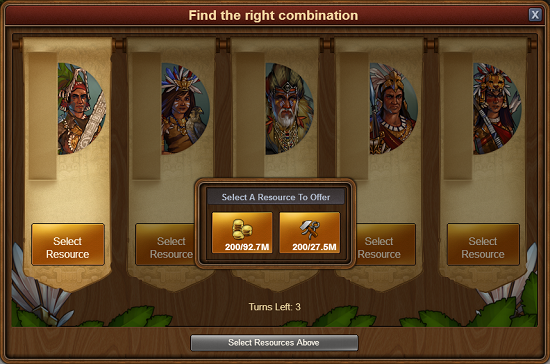
Once you have selected the resources, you can hit the 'Negotiate' button (at this point 1 attempt will be withdrawn from your attempts bar). Keep in mind that you will also be giving away these resources to the locals from your personal stock. The locals will then provide you with feedback on your guess, which will look like this:

- Correct - your offer was accepted! However, other locals may also want this resource (though not necessarily).
- Wrong Person - your offer was rejected. But at least one other local is searching for this resource!
- Incorrect - your offer was rejected, and no local needs this resource (it will also be grayed out in the resource selection window on your next turn).
You have likely noticed the negotiation window has 'Turns' - this is because the locals want you to give them the correct resources in 3 turns. Every time you select 5 resources and hit 'Negotiate', you will spend a turn:
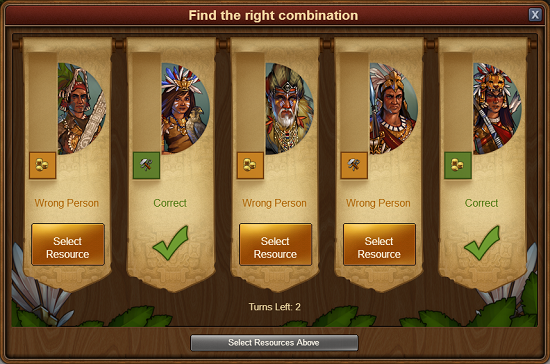
Once you've spent all 3 turns, you can only buy a turn with diamonds or give up the attempt and come back at a later time. If you decide to give up and try again later, the set of resources you can choose from will remain the same, but who wants what among the locals will be randomly changed.
Expedition Difficulties
The expedition map can be completed not once, but three times per week! To conquer the map again, you have to unlock higher difficulties (level II and III). Click the star icon in the top left corner to open the difficulties overview:
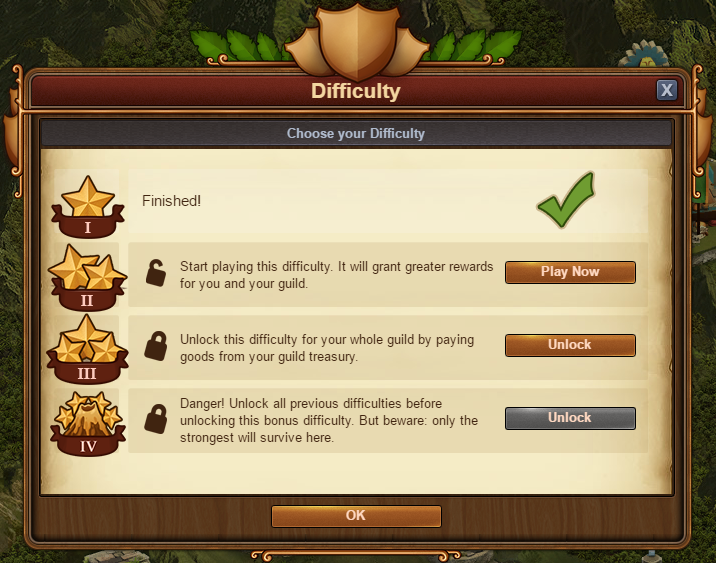
As you can see, the default difficulty is I and it's available for free. To unlock the higher ones, a guild leader or founder has to pay goods from the guild treasury. But everyone can donate the goods to the guild treasury, only spending them is limited to leaders/founders.
The Costs of Unlocking Difficulties depend on the age and number of your guild members when the expedition beings. Each player in your guild will generate a cost based on their age. Your guild will need to pay the cumulative cost for all guild members in order to unlock the difficulty. Unlocking a difficulty makes it available to all guild members who are taking part in the current Expedition.
Temple of Relics
The Temple of Relics is a Great Building designed specifically for fans of Guild Expeditions. You can get blueprints for it either by solving encounters in expeditions, or by contributing to the same Great Building in cities of other players. It has only one passive bonus - the Relic Hunt ability.

Relic Hunt gives you a chance to find special rewards whenever you solve an encounter in an expedition. You will locate an icon on the right hand side on the expedition map - when it's highlighted it means there is at least 1 relic on the map that you can collect. If a relic is under a fogged area, you will need to progress on the map for the fog to disappear so that you can collect the relic. Make sure you collect any relics before proceeding to the next difficulty as any uncollected relics will disappear!

The rewards come in 3 groups, each of them a different type of relic - common, uncommon, and rare. Of course the chances are higher to get a common relic, and lower to get a rare relic. But this changes as your Temple of Relics levels up - the chances to win a rare relic will increase with each level, while the ones for a common relic will decrease.
Here is an overview of what rewards these relics can give you, and the respective probability to win those specific rewards.
| Common
(Silver) |
 |
Uncommon
(Gold) |
 |
Rare
(Jade) |
 |
|---|---|---|---|---|---|
20 Forge Points
|
10%
|
100 Forge Points
|
20%
|
Oasis
|
35%
|
25 Goods (1 type)
|
20%
|
200 Goods (1 type)
|
20%
|
Bazaar
|
35%
|
5 Light Units
|
3%
|
10 Rogues
|
12,5%
|
Shrine of Knowledge
|
10%
|
5 Ranged Units
|
3%
|
Watchfire
|
35%
|
Wishing Well
|
10%
|
5 Fast Units
|
3%
|
Small Medals Package
|
12,5%
|
Renovation Kit
|
10%
|
5 Heavy Units
|
3%
| ||||
5 Artillery Units
|
3%
| ||||
Premium Decoration
|
25%
| ||||
Double Blueprint
|
30%
|
